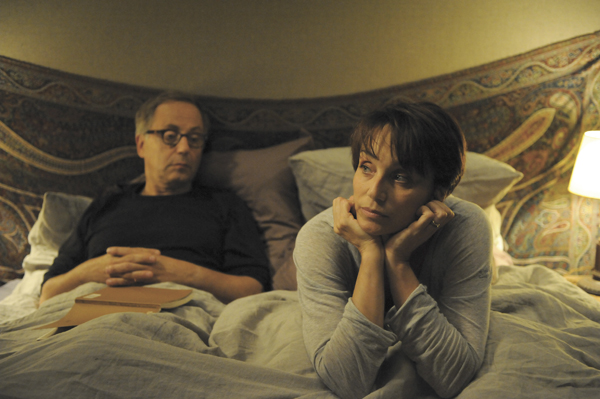Following François Ozon’s last film, a bubbly 1970s kitsch piece, Potiche, his new social farce returns the Swimming Pool writer/director in familiar creative territory. Here, Ozon again plays with class, sex, and voyeurism in art, in a light but inventive comedy.
A failed writer-turned-teacher, Germain (Fabrice Luchini) is intrigued and flustered when one of his high school students, Claude (Ernst Umhauer), hands in a promising writing assignment. His well-written narrative explains the joy he felt upon entering the happy middle-class home of a classmate for the first time. He describes the house in detail as a place he would never otherwise be invited into without a good reason—Claude has volunteered to be his new friend’s math tutor. He seems critical and self-aware, and Germain encourages him to continue writing.
Claude gives his teacher another paper about his new friend’s household, and another. His writing becomes more like blog entries. With each, Claude’s interest in his classmate’s family develops in unsettling ways. He seduces his male friend; he fantasizes about the father, a sports fan with a beer belly; and begins lobbying for the mother’s attention as both a new son and a new lover.
The audience has to wonder alongside Germain, how much of his student’s prose is true, and what Claude really wants to achieve from his writing. Is it homoerotic? Is it even really sexual? Part telenovela, diary, Playboy letter, bildungsroman, and expression of class contempt, partly fact and partly fiction, Claude’s words become a sociopathic fantasy so eerie and charged that there’s no way to predict what actions he might take next.
Germain and his wife, failing gallery owner Jeanne (Kristin Scott Thomas), can’t stop reading Claude’s pulpy version of reality. They find what they want in his words, reading together in bed, and wait anxiously for each new entry. Is it the writing that they like, or is it Claude—his perspective, his sexuality, his mysterious motives? Worse, and more disturbing to Germain: is it really possible to draw those lines and define the difference? The film seems to underline a selfish wish fulfillment in the way we appreciate art and relationships, taking what we want for our own secret purposes.
Ozon has always been a sexually provocative director—the bulk of his filmwork is filled with unexpected entanglements and complicated relationships hot with desire. (Swimming Pool alone is lodged on a large share of top 10 lists for the sexiest film of all time.) In the House seems to explore what this kind of professional identity might mean for one of France’s most prolific contemporary directors. What do we really enjoy in movies? In stories? In other people?
Simple directorial flourishes turn Claude’s narratives into dreamscapes, weaving in and out of reality. Slowly, Germain and Jeanne become part of the story line, only somewhat unwillingly. Germain attempts to help Claude improve his first-person narrative’s plot and purpose, and the student responds eagerly but with malice, seemingly acting out Germain’s desires. At one point, Germain asks why he kissed his classmate, and Claude asks if that wasn’t desirable for his audience.
But even with so much menace, Ozon keeps the film light. With their framed Klee posters and a doll collection in the guest room, the family of Claude’s obsession is depicted with ridiculous class clichés meant for laughs. If Claude and his two readers hadn’t taken the family so seriously, neither would we. Jeanne, too, is played as a joke. Her gallery sells paintings of penises turned into swastikas and Buddhist lotus flowers. And Germain is a bumbling intellectual too caught up in himself to keep pace with his pupil’s growing understanding of his teacher—it’s fun to watch Germain fumble.
The leads are enjoyably difficult to read, their real desires as closed to the audience as they are to themselves. And it’s such a pleasure to see Kristin Scott Thomas in a comedic role—that’s almost worth the admission price alone. It’s a lovely, layered film, tense and hilarious, and there are enough gestures here towards the complexity of moviemaking’s motives and expectations to make this otherwise fun film worth thinking about afterwards.







Leave A Comment